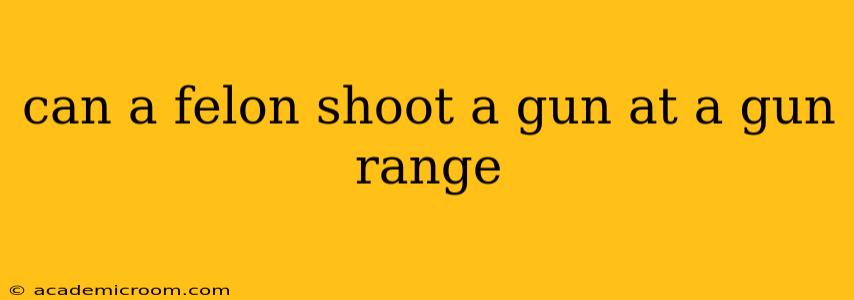Can a Felon Shoot a Gun at a Gun Range?
The short answer is: generally, no. Federal and state laws prohibit convicted felons from possessing firearms, and this typically includes using them at a gun range. However, there are important nuances and exceptions to consider, making this a complex legal issue. This article will explore the specifics to provide a comprehensive understanding.
What are the Federal Laws Regarding Felons and Firearms?
The core federal law restricting firearm ownership for felons is found in 18 U.S. Code § 922(g). This section prohibits various categories of individuals from possessing firearms, including those convicted of a felony. The definition of "felony" is crucial here and varies slightly depending on state and federal law. Generally, it refers to crimes punishable by imprisonment for a term exceeding one year. This prohibition extends to the actual possession of a firearm, as well as the constructive possession (meaning the felon has knowledge of and control over a firearm even if not in their immediate physical possession).
Can State Laws Differ?
Yes, absolutely. While federal law sets a baseline, individual states can have stricter laws regarding firearm ownership for felons. Some states may have specific exceptions or stricter definitions of what constitutes a felony that prevents firearm possession. It's crucial to understand the specific laws in your state, as they can significantly impact your legal standing.
What About Gun Ranges and Their Policies?
Gun ranges are privately owned businesses and, as such, have the right to set their own rules and policies. Most gun ranges will refuse service to anyone they suspect is legally prohibited from possessing firearms, regardless of state or federal laws. This is largely due to the liability issues involved. Providing a firearm to someone who is legally barred from owning one could result in significant legal trouble for the gun range. Even if a felon manages to obtain a firearm elsewhere and attempts to use it, the range likely has a responsibility to refuse service and contact law enforcement.
Can a Felon Ever Legally Shoot a Gun Again?
In some cases, yes. Certain states have provisions for restoring firearm rights after a felony conviction. This typically involves a complex process of petitioning the court, demonstrating rehabilitation, and meeting specific criteria. The process varies widely by state and is often lengthy and challenging. Additionally, federal law can override state restorations in certain circumstances. It's extremely important to consult with a legal professional specializing in firearms law to determine if restoration of gun rights is a possibility in your specific situation.
What Happens if a Felon is Caught Shooting at a Gun Range?
The consequences can be severe, potentially including:
- Arrest: This is a near certainty.
- Additional Felony Charges: Possessing a firearm after a felony conviction is itself a serious felony, often with harsh penalties.
- Imprisonment: Sentencing will depend on the specifics of the case and the jurisdiction.
- Increased Parole or Probation Violations: For those on parole or probation, this could lead to revocation and return to prison.
Can I shoot a gun if my felony was expunged?
Expungement doesn't automatically restore gun rights. While expungement seals a criminal record, it doesn't always erase the legal consequences of the conviction, including restrictions on gun ownership. It is imperative to review the specific language of your expungement and seek legal counsel.
In conclusion, while the specifics vary depending on state and federal laws, as well as the individual circumstances of the felon, the general answer remains a resounding no. The potential legal ramifications of a felon attempting to shoot a gun at a gun range are severe. If you are a convicted felon considering firearm use, you must seek legal counsel to determine your legal options and avoid potentially devastating consequences.
